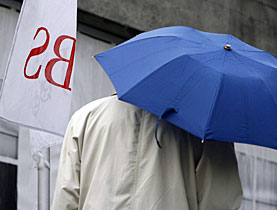Switzerland announces bank bail-out plan

The government has announced a rescue package for the country's financial system that will inject cash into its biggest bank, UBS.
The Swiss National Bank (SNB) has agreed to put SFr6 billion ($5.23 billion) into UBS, in a move that aims to strengthen the bank’s capital base and reduce its balance sheet.
In return, Switzerland’s central bank will take a 9.3 per cent stake in UBS.
The surprise move by the cabinet, the SNB and the Swiss Federal Banking Commission was announced on Thursday morning.
Based on an agreement with the SNB, UBS will transfer up to $60 billion of assets to a newly created fund entity and will capitalise the fund with equity of up to $6 billion.
The SNB will finance the fund with a loan of up to $54 billion, secured on the assets of the fund, taking over control and ownership of the entity.
The move follows a cabinet meeting on Wednesday – the first in two weeks – and is the latest in a series of high-profile reassurances from governments in the United States and Europe attempting to pacify volatile markets.
The country’s second largest bank, Credit Suisse, also announced that it is raising SFr10 billion from private investors including the Qatar Investment Authority.
The bank however said it had “decided not to participate at this time” in the stabilisation programme, basing its decision on the relatively low level of affected assets in its portfolio and its good access to capital markets.
Credit Suisse announced a SFr1.3 billion third quarter loss while UBS made SFr296 million profit in the same period.
Accountholder protection
In a media conference on Thursday morning, the acting finance minister, Eveline Widmer-Schlumpf, argued strong banks would be the best measure of protection for accountholders.
“I have said that we in the government are, as before, of the understanding that the best protection for bank accounts is a solid basis for our banks – a capital base – and behaviour that inspires confidence,” she said.
The government would, however, act quickly, the minister added, to follow in the footsteps of other European governments in raising the accountholder protection in all Swiss banks above the current SFr30,000 threshold.
“We see now – and we cannot detach ourselves from these developments – that internationally, savings protections are being strengthened and we want to do this too,” Widmer-Schlumpf said.
Cabinet will begin working to prepare recommendations so that parliament can make a decision in its December session, she added.
Toxic assets gone
Thursday’s move has allowed UBS to rid itself of virtually all of its “toxic assets” while significantly boosting its cash safety net against future risks. The bank’s chief executive, Marcel Rohner, said: “This transaction gives us comfort.”
“The extremely difficult market environment led us to accelerate our risk reduction with a definite move. Our aim is to protect our clients form the impact of the crisis to the fullest extent possible and to provide our shareholders an opportunity to renew confidence in the bank,” he added in a statement.
UBS is expected to call an extraordinary shareholders’ meeting in November to get approval for the refinancing.
“The cabinet is confident that this package of measures will contribute to the lasting strengthening of the Swiss financial system,” said a finance ministry statement.
“The resulting stabilisation is beneficial for overall economic development in Switzerland and is in the interests of the country as a whole.”
The economics ministry on Tuesday had rejected accusations in the media that the government had been slow to respond to the crisis, and cabinet minister Moritz Leuenberger said his colleagues were keen to not add “fuel to the fire of speculation”.
President Pascal Couchepin reiterated on Thursday that the cabinet’s message had consistently been to observe, reflect and then intervene when necessary to consolidate the financial system.
Shares in UBS and Credit Suisse slumped on Thursday morning before climbing toward the afternoon.
swissinfo with agencies
At the start of the week the Swiss government said that it did not need to follow the example of many other countries, which had raised massive amounts of taxpayers’ money to bail out stricken banks.
Following the United States’ $700 billion (SFr790 billion) rescue package earlier this month, Britain announced a £37 billion (SFr73 billion) cash injection while Germany was poised to prop up its ailing financial system with a €470 billion (SFr724 billion) hand out.
Spain said it would provide up to €100 billion of guarantees for new debt issued by commercial banks in 2008. Norway and Portugal have also followed suit with their own bail out cash packages.
Germany, New Zealand and the United Arab Emirates are the latest countries to guarantee all bank deposits.
Iceland is close to bankrupcy.

In compliance with the JTI standards
More: SWI swissinfo.ch certified by the Journalism Trust Initiative











You can find an overview of ongoing debates with our journalists here . Please join us!
If you want to start a conversation about a topic raised in this article or want to report factual errors, email us at english@swissinfo.ch.